人教版高中英语选修7Unit 3 Under the sea 动词-ing形式的被动式课件(共31张PPT)
文档属性
| 名称 | 人教版高中英语选修7Unit 3 Under the sea 动词-ing形式的被动式课件(共31张PPT) |  | |
| 格式 | zip | ||
| 文件大小 | 1.3MB | ||
| 资源类型 | 教案 | ||
| 版本资源 | 人教版(新课程标准) | ||
| 科目 | 英语 | ||
| 更新时间 | 2019-07-25 18:34:07 | ||
图片预览

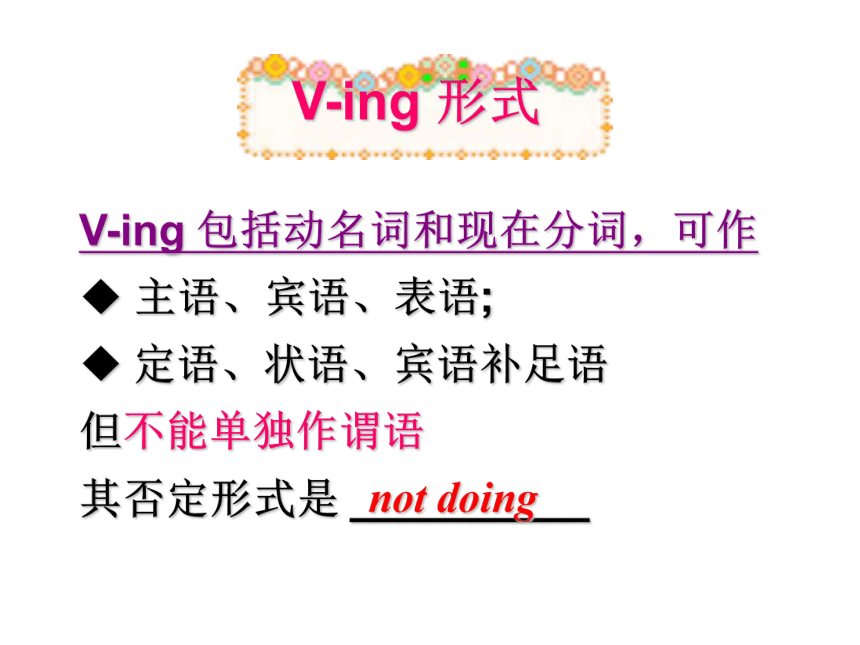
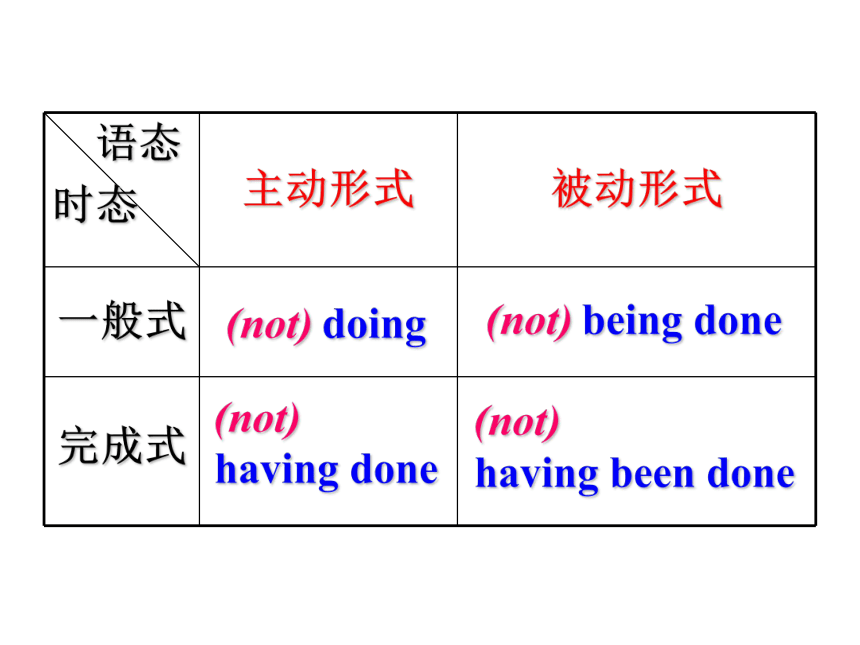
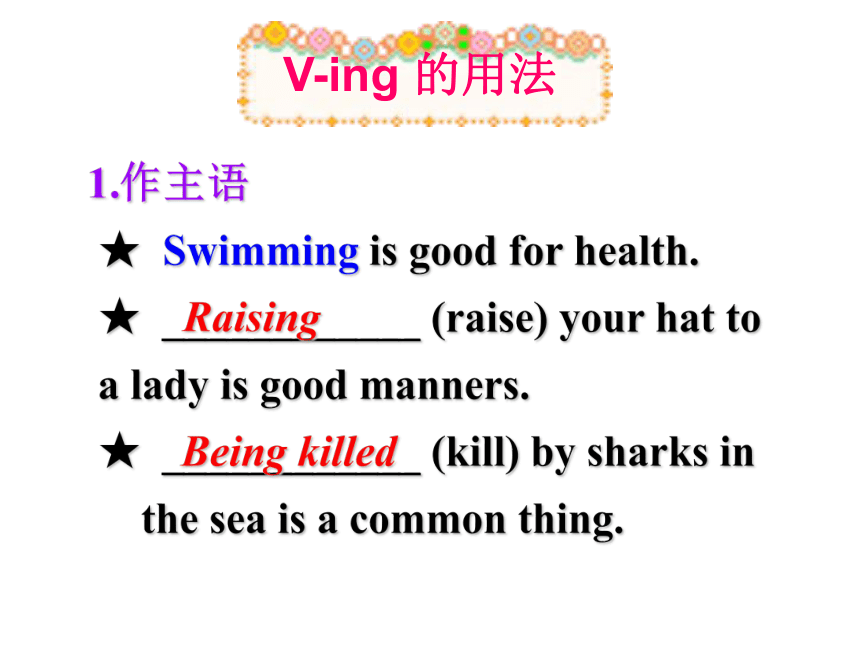
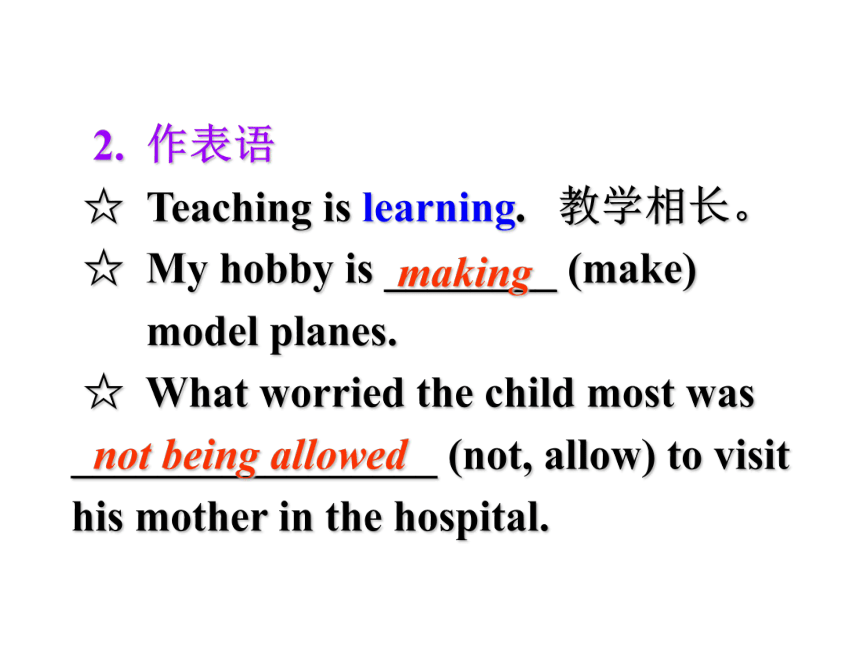
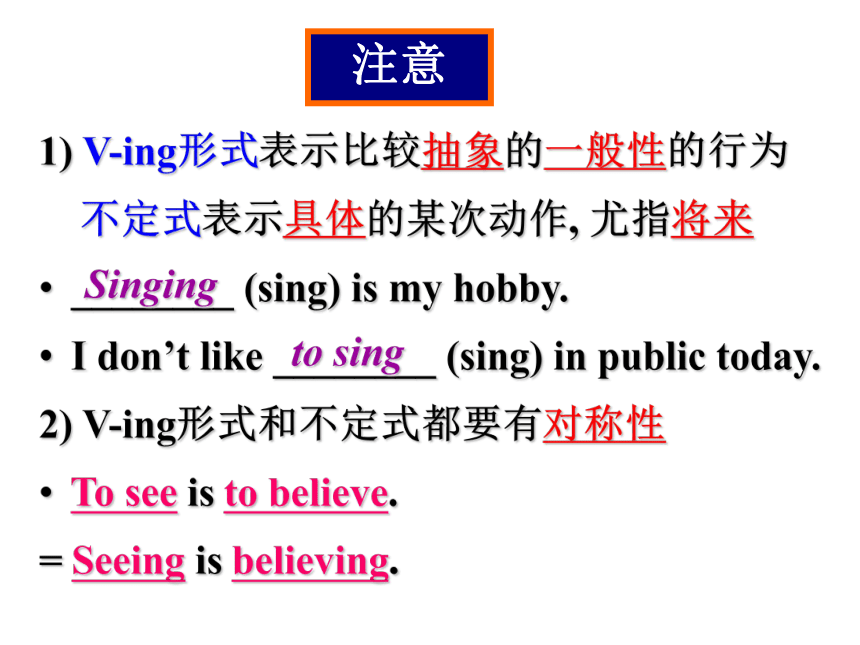
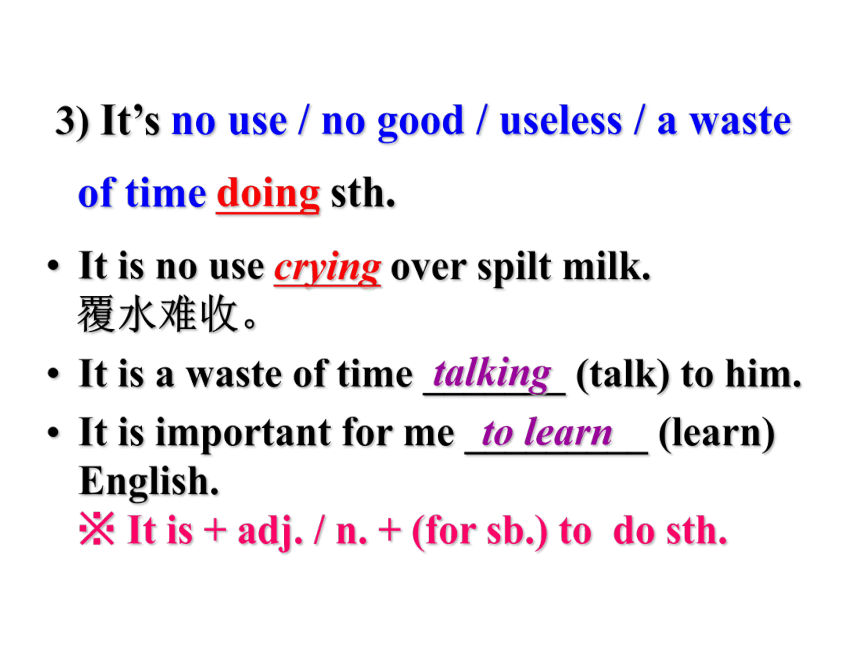
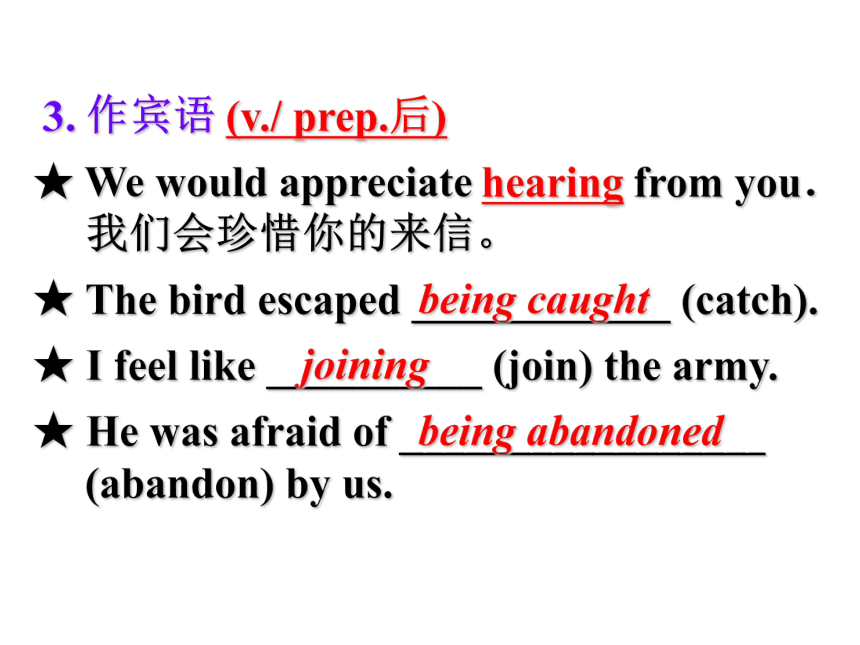
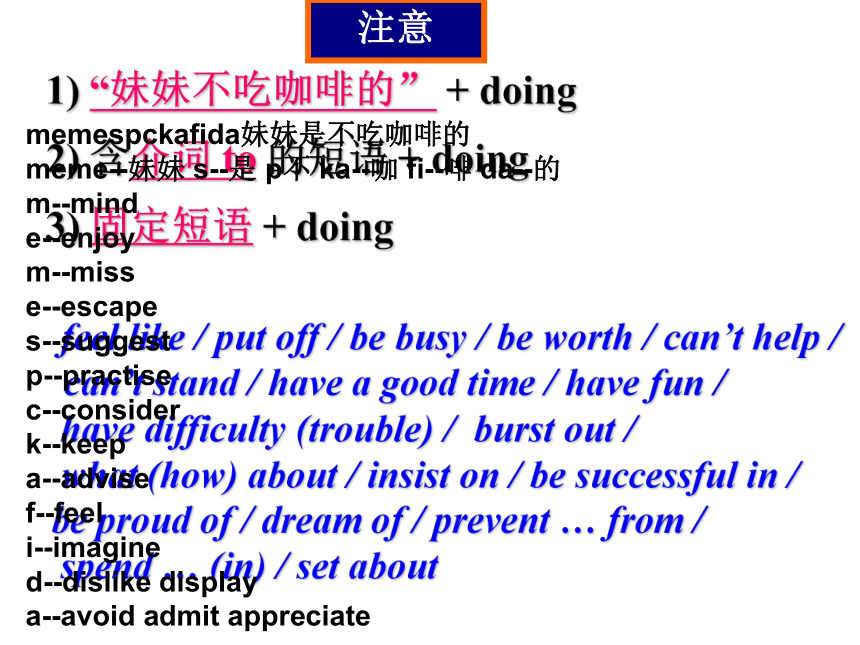
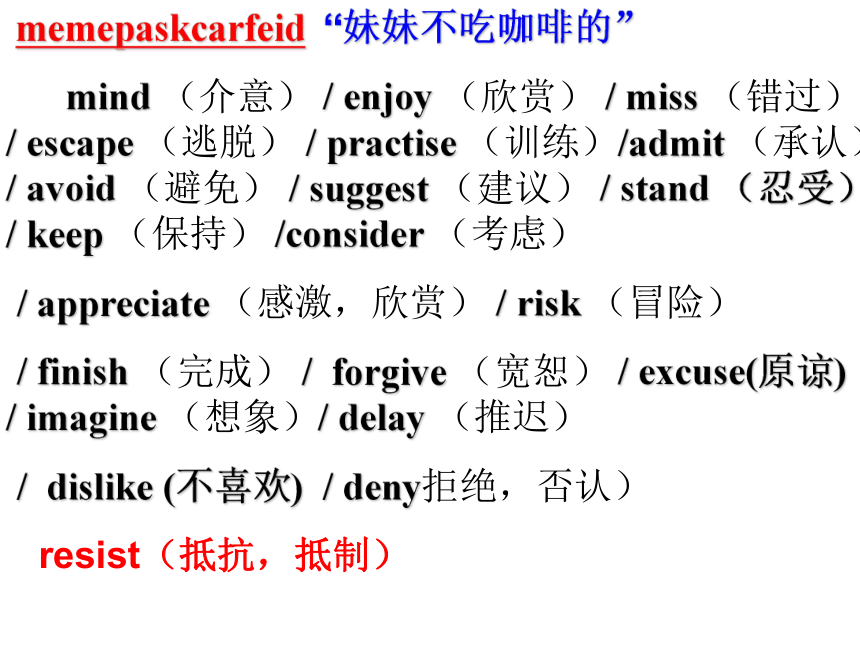

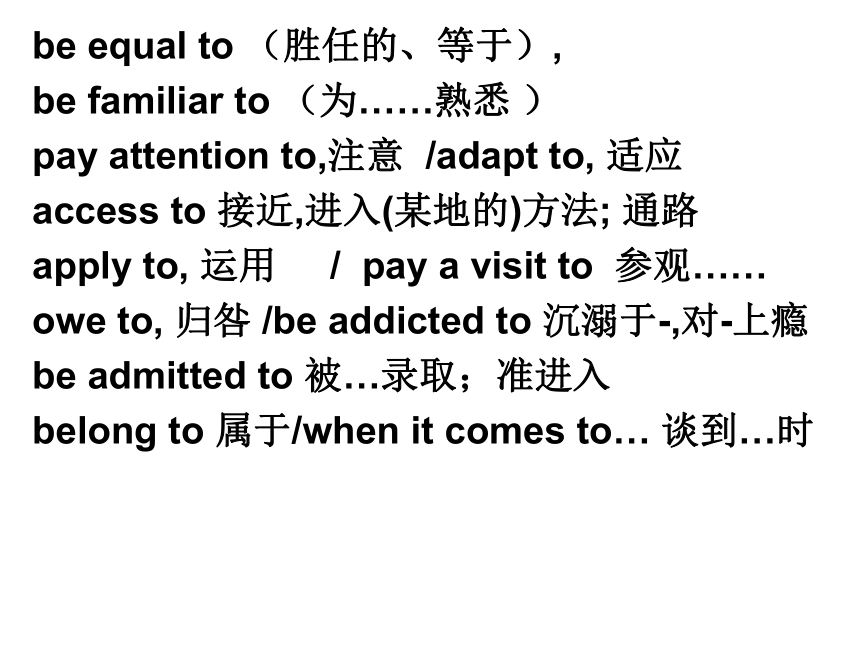
文档简介
(共31张PPT)
V-ing 包括动名词和现在分词,可作
主语、宾语、表语;
定语、状语、宾语补足语
但不能单独作谓语
其否定形式是 __________
V-ing 形式
not doing
(not) doing
(not) being done
(not)
having done
(not)
having been done
语态
时态
主动形式
被动形式
一般式
完成式
1.作主语
★ Swimming is good for health.
★ ____________ (raise) your hat to a lady is good manners.
★ ____________ (kill) by sharks in
the sea is a common thing.
Raising
Being killed
V-ing 的用法
2. 作表语
☆ Teaching is learning. 教学相长。
☆ My hobby is ________ (make)
model planes.
☆ What worried the child most was
_________________ (not, allow) to visit his mother in the hospital.
making
not being allowed
1) V-ing形式表示比较抽象的一般性的行为
不定式表示具体的某次动作, 尤指将来
________ (sing) is my hobby.
I don’t like ________ (sing) in public today.
2) V-ing形式和不定式都要有对称性
To see is to believe.
= Seeing is believing.
Singing
to sing
注意
3) It’s no use / no good / useless / a waste of time doing sth.
It is no use crying over spilt milk.
覆水难收。
It is a waste of time _______ (talk) to him.
It is important for me _________ (learn) English.
※ It is + adj. / n. + (for sb.) to do sth.
talking
to learn
3. 作宾语 (v./ prep.后)
★ We would appreciate hearing from you.
我们会珍惜你的来信。
★ The bird escaped ____________ (catch).
★ I feel like __________ (join) the army.
★ He was afraid of _________________
(abandon) by us.
being abandoned
being caught
joining
1) “妹妹不吃咖啡的” + doing
2) 含介词 to 的短语 + doing
3) 固定短语 + doing
注意
feel like / put off / be busy / be worth / can’t help / can’t stand / have a good time / have fun /
have difficulty (trouble) / burst out /
what (how) about / insist on / be successful in /
be proud of / dream of / prevent … from /
spend … (in) / set about
memespckafida妹妹是不吃咖啡的 meme--妹妹 s--是 p不 ka--咖 fi--啡 da--的 m--mind e--enjoy m--miss e--escape s--suggest p--practise c--consider k--keep a--advise f--feel i--imagine d--dislike display a--avoid admit appreciate
memepaskcarfeid “妹妹不吃咖啡的”
mind (介意) / enjoy (欣赏) / miss (错过) / escape (逃脱) / practise (训练)/admit (承认) / avoid (避免) / suggest (建议) / stand (忍受)/ keep (保持) /consider (考虑)
/ appreciate (感激,欣赏) / risk (冒险)
/ finish (完成) / forgive (宽恕) / excuse(原谅) / imagine (想象)/ delay (推迟)
/ dislike (不喜欢) / deny拒绝,否认)
resist(抵抗,抵制)
高中阶段常见的带介词to的短语,后接-ing分词或名词。
admit to(承认), contribute to(捐助、贡献),
get down to(着手做), give way to(让位于)
look forward to(期待), take to(从事),
turn to (求助于), stick to(忠于、坚持),
point to(指向、表明), see to (注意、处理),
be/get used to,be /get accustomed to 习惯于
devote oneself to( 献身于) , lead to (导致)
be equal to (胜任的、等于),
be familiar to (为……熟悉 )
pay attention to,注意 /adapt to, 适应
access to 接近,进入(某地的)方法; 通路
apply to, 运用 / pay a visit to? 参观……
owe to, 归咎 /be addicted to 沉溺于-,对-上瘾
be admitted to 被…录取;准进入
belong to 属于/when it comes to… 谈到…时
4) begin, start, continue, intend, hate, like, love + doing / to do 意义无多大区别
※ I’d like / love / prefer + to do
5) doing / to do 意义不同的有:
remember, forget, regret, stop, go on, try, mean
6) want, need, require + doing / to be done
7) allow, permit, forbid, advise + doing / sb. to do
8) 动名词的逻辑主语:
名词所有格 / adj.性物主代词 (主 / 宾 / 表)
名词普通格 / 宾格代词 (宾 / 表)
+ (not) doing
Do you mind ________________ (我开窗户)?
What’s troubling him is _______________ (他没有带书) his book.
_____ the meeting himself gave them a great deal of encouragement.
A. The president will attend
B. The president to attend
C. The president’s attending
D. The president attended
my / me opening …
his not carrying
C
4. 作定语
*The girl standing there is my sister.
*This is a piece of __________ (surprise) news.
*The farmers _________ (work) in the fields are tired.
*The problem ______________ (discuss)
now is very important.
surprising
being discussed
working
去年造好的桥 _______________________
正在建造的桥 _______________________
将要建造的桥 _______________________
正在进行
doing
done
being done
to be done
已经完成
正在进行
将要发生
the bridge built last year
the bridge being built now
the bridge to be built soon
注意:过去分词做定语的三种被动式
主动
被动
5. 作状语
◆ Hearing the good news, he jumped with joy.
◆ He sat at the table, ________ (read) China Daily.
◆ __________ (be) able to understand English, he didn’t know what they wanted.
◆ ________ (work) hard, you will succeed.
◆ __________________ (teach) many times, the boy still didn’t know how to do it.
◆ Her husband died suddenly, ________ (leave) her with five children.
reading
Working
Not being
(时间)
(伴随)
(原因)
Having been taught
(让步)
(条件)
leaving
(结果)
1) 分词的逻辑主语就是该句子的主语,
但有时两个主语不一致,我们也可以用 n. / pron. + 分词,称为独立主格结构。
It being a holiday, all the shops were shut.
There being no bus, we had to walk back home.
Her wallet stolen, she had no money to buy a ticket.
注意
2) 有少数结构并不表示句子主语的动作, 而是表示说话人的态度。如generally speaking(一般来说), judging from…(根据……来判断), considering…(考虑到……), talking of…(谈到……,提到……), supposing…(假如……)等,它们的逻辑主语和句子的主语不一致。这种短语可以被称之为句子的状语,也可当作一个插入语。
Generally speaking, the novel is not very inspiring.
Judging from what you say, he ought to succeed.
Talking of Sue, I met her new boyfriend last week.
6. 作宾语补足语:
● I saw people coming and going in
the street.
● I heard her ________ (sing) a song
in her room.
● You’ll find the topic _______________
(discuss) everywhere now.
being discussed
singing
1) 可以带 V-ing 作宾补的动词有:
see, hear, watch, notice, smell, find, feel, have, get, catch, keep, leave
smell sth. burning 闻到有东西烧焦
catch sb. doing 当场撞见某人做某事
2) with(out) + 宾 + doing / done / to do
注意
3) (to) do / V-ing / V-ed 作宾补的区别:
I saw him take away the dictionary just now.
I saw him taking away the dictionary on the desk.
(to) do 动作全过程已结束
doing 动作正在进行
(拿走了那本字典)
(正在拿那本字典)
I saw the dictionary taken away by a child.
I saw the dictionary being taken away from the desk.
done 表被动已经完成
being done 表被动正在发生
(字典已经被拿走)
(字典正在被拿走)
He has always insisted on his ___ Dr. Turner instead of Mr. Turner.
A. been called B. called
C. having called D. being called
2. Do you mind ___ alone at home?
A. Jane leaving B. Jane having left
C. Jane’s being left D. Jane to be left
D
C
3. -- You were brave enough to raise objections at the meeting.
-- Well, now I regret ____ that.
A. to do
B. to be doing
C. to have done
D. having done
D
4. -- What made Bill so angry?
-- ___. His girl friend promised to come at 8:30, but she hasn’t come yet.
A. Having kept waiting
B. Being kept waiting
C. To be kept waiting
D. He was kept waiting
B
5. Tony was very unhappy for ____ to the party.
A. having not been invited
B. not having invited
C. having not invited
D. not having been invited
D
1. The building ____ in our school is for us teachers. Though there’s noise most of the day, we still feel happy about it.
A. built B. having been built
C. to be built D. being built
D
2. _________ the whole story, Jane decided not to see the film.
A. Having been told B. Having told C. Been told D. Telling
3. ______ your homework, you mustn’t listen to music.
A. When do B. When to do
C. When doing D. When you doing
A
C
4. _____ the idiom, he looked it up in the dictionary.
A. Not learning
B. Never having learned
C. Having not learned
D. Having never learned
B
5. The missing boy was last seen ______ near the river.
A. playing B. to be playing
C. play D. to play
6. Any driver ______ a license ought to be punished.
A. doesn’t have B. having not
C. has not D. not having
A
D
V-ing 包括动名词和现在分词,可作
主语、宾语、表语;
定语、状语、宾语补足语
但不能单独作谓语
其否定形式是 __________
V-ing 形式
not doing
(not) doing
(not) being done
(not)
having done
(not)
having been done
语态
时态
主动形式
被动形式
一般式
完成式
1.作主语
★ Swimming is good for health.
★ ____________ (raise) your hat to a lady is good manners.
★ ____________ (kill) by sharks in
the sea is a common thing.
Raising
Being killed
V-ing 的用法
2. 作表语
☆ Teaching is learning. 教学相长。
☆ My hobby is ________ (make)
model planes.
☆ What worried the child most was
_________________ (not, allow) to visit his mother in the hospital.
making
not being allowed
1) V-ing形式表示比较抽象的一般性的行为
不定式表示具体的某次动作, 尤指将来
________ (sing) is my hobby.
I don’t like ________ (sing) in public today.
2) V-ing形式和不定式都要有对称性
To see is to believe.
= Seeing is believing.
Singing
to sing
注意
3) It’s no use / no good / useless / a waste of time doing sth.
It is no use crying over spilt milk.
覆水难收。
It is a waste of time _______ (talk) to him.
It is important for me _________ (learn) English.
※ It is + adj. / n. + (for sb.) to do sth.
talking
to learn
3. 作宾语 (v./ prep.后)
★ We would appreciate hearing from you.
我们会珍惜你的来信。
★ The bird escaped ____________ (catch).
★ I feel like __________ (join) the army.
★ He was afraid of _________________
(abandon) by us.
being abandoned
being caught
joining
1) “妹妹不吃咖啡的” + doing
2) 含介词 to 的短语 + doing
3) 固定短语 + doing
注意
feel like / put off / be busy / be worth / can’t help / can’t stand / have a good time / have fun /
have difficulty (trouble) / burst out /
what (how) about / insist on / be successful in /
be proud of / dream of / prevent … from /
spend … (in) / set about
memespckafida妹妹是不吃咖啡的 meme--妹妹 s--是 p不 ka--咖 fi--啡 da--的 m--mind e--enjoy m--miss e--escape s--suggest p--practise c--consider k--keep a--advise f--feel i--imagine d--dislike display a--avoid admit appreciate
memepaskcarfeid “妹妹不吃咖啡的”
mind (介意) / enjoy (欣赏) / miss (错过) / escape (逃脱) / practise (训练)/admit (承认) / avoid (避免) / suggest (建议) / stand (忍受)/ keep (保持) /consider (考虑)
/ appreciate (感激,欣赏) / risk (冒险)
/ finish (完成) / forgive (宽恕) / excuse(原谅) / imagine (想象)/ delay (推迟)
/ dislike (不喜欢) / deny拒绝,否认)
resist(抵抗,抵制)
高中阶段常见的带介词to的短语,后接-ing分词或名词。
admit to(承认), contribute to(捐助、贡献),
get down to(着手做), give way to(让位于)
look forward to(期待), take to(从事),
turn to (求助于), stick to(忠于、坚持),
point to(指向、表明), see to (注意、处理),
be/get used to,be /get accustomed to 习惯于
devote oneself to( 献身于) , lead to (导致)
be equal to (胜任的、等于),
be familiar to (为……熟悉 )
pay attention to,注意 /adapt to, 适应
access to 接近,进入(某地的)方法; 通路
apply to, 运用 / pay a visit to? 参观……
owe to, 归咎 /be addicted to 沉溺于-,对-上瘾
be admitted to 被…录取;准进入
belong to 属于/when it comes to… 谈到…时
4) begin, start, continue, intend, hate, like, love + doing / to do 意义无多大区别
※ I’d like / love / prefer + to do
5) doing / to do 意义不同的有:
remember, forget, regret, stop, go on, try, mean
6) want, need, require + doing / to be done
7) allow, permit, forbid, advise + doing / sb. to do
8) 动名词的逻辑主语:
名词所有格 / adj.性物主代词 (主 / 宾 / 表)
名词普通格 / 宾格代词 (宾 / 表)
+ (not) doing
Do you mind ________________ (我开窗户)?
What’s troubling him is _______________ (他没有带书) his book.
_____ the meeting himself gave them a great deal of encouragement.
A. The president will attend
B. The president to attend
C. The president’s attending
D. The president attended
my / me opening …
his not carrying
C
4. 作定语
*The girl standing there is my sister.
*This is a piece of __________ (surprise) news.
*The farmers _________ (work) in the fields are tired.
*The problem ______________ (discuss)
now is very important.
surprising
being discussed
working
去年造好的桥 _______________________
正在建造的桥 _______________________
将要建造的桥 _______________________
正在进行
doing
done
being done
to be done
已经完成
正在进行
将要发生
the bridge built last year
the bridge being built now
the bridge to be built soon
注意:过去分词做定语的三种被动式
主动
被动
5. 作状语
◆ Hearing the good news, he jumped with joy.
◆ He sat at the table, ________ (read) China Daily.
◆ __________ (be) able to understand English, he didn’t know what they wanted.
◆ ________ (work) hard, you will succeed.
◆ __________________ (teach) many times, the boy still didn’t know how to do it.
◆ Her husband died suddenly, ________ (leave) her with five children.
reading
Working
Not being
(时间)
(伴随)
(原因)
Having been taught
(让步)
(条件)
leaving
(结果)
1) 分词的逻辑主语就是该句子的主语,
但有时两个主语不一致,我们也可以用 n. / pron. + 分词,称为独立主格结构。
It being a holiday, all the shops were shut.
There being no bus, we had to walk back home.
Her wallet stolen, she had no money to buy a ticket.
注意
2) 有少数结构并不表示句子主语的动作, 而是表示说话人的态度。如generally speaking(一般来说), judging from…(根据……来判断), considering…(考虑到……), talking of…(谈到……,提到……), supposing…(假如……)等,它们的逻辑主语和句子的主语不一致。这种短语可以被称之为句子的状语,也可当作一个插入语。
Generally speaking, the novel is not very inspiring.
Judging from what you say, he ought to succeed.
Talking of Sue, I met her new boyfriend last week.
6. 作宾语补足语:
● I saw people coming and going in
the street.
● I heard her ________ (sing) a song
in her room.
● You’ll find the topic _______________
(discuss) everywhere now.
being discussed
singing
1) 可以带 V-ing 作宾补的动词有:
see, hear, watch, notice, smell, find, feel, have, get, catch, keep, leave
smell sth. burning 闻到有东西烧焦
catch sb. doing 当场撞见某人做某事
2) with(out) + 宾 + doing / done / to do
注意
3) (to) do / V-ing / V-ed 作宾补的区别:
I saw him take away the dictionary just now.
I saw him taking away the dictionary on the desk.
(to) do 动作全过程已结束
doing 动作正在进行
(拿走了那本字典)
(正在拿那本字典)
I saw the dictionary taken away by a child.
I saw the dictionary being taken away from the desk.
done 表被动已经完成
being done 表被动正在发生
(字典已经被拿走)
(字典正在被拿走)
He has always insisted on his ___ Dr. Turner instead of Mr. Turner.
A. been called B. called
C. having called D. being called
2. Do you mind ___ alone at home?
A. Jane leaving B. Jane having left
C. Jane’s being left D. Jane to be left
D
C
3. -- You were brave enough to raise objections at the meeting.
-- Well, now I regret ____ that.
A. to do
B. to be doing
C. to have done
D. having done
D
4. -- What made Bill so angry?
-- ___. His girl friend promised to come at 8:30, but she hasn’t come yet.
A. Having kept waiting
B. Being kept waiting
C. To be kept waiting
D. He was kept waiting
B
5. Tony was very unhappy for ____ to the party.
A. having not been invited
B. not having invited
C. having not invited
D. not having been invited
D
1. The building ____ in our school is for us teachers. Though there’s noise most of the day, we still feel happy about it.
A. built B. having been built
C. to be built D. being built
D
2. _________ the whole story, Jane decided not to see the film.
A. Having been told B. Having told C. Been told D. Telling
3. ______ your homework, you mustn’t listen to music.
A. When do B. When to do
C. When doing D. When you doing
A
C
4. _____ the idiom, he looked it up in the dictionary.
A. Not learning
B. Never having learned
C. Having not learned
D. Having never learned
B
5. The missing boy was last seen ______ near the river.
A. playing B. to be playing
C. play D. to play
6. Any driver ______ a license ought to be punished.
A. doesn’t have B. having not
C. has not D. not having
A
D
